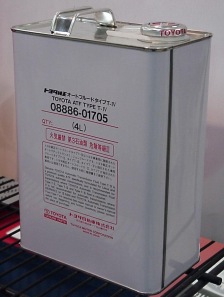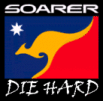

Twin Turbo Soarer: Check dipstick, Dexron II (or III), or Toyota Type-IV
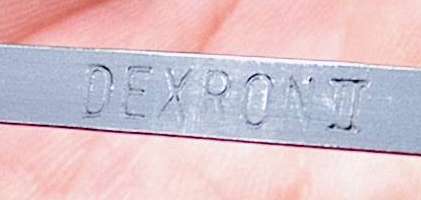 |
Mike's TT dipstick clearly says Dexron II, BUT he too had the world infamous transmission shudder that disappeared after a 12 litre flush with Toyota Type IV transmission fluid. So Mike is another convert to type IV. Others have used Dexron with success in the TT - so if everything is fine then stay with the Dexron - if if has a shudder give Type IV a go. |
However for the V8 there is no doubt: Toyota type IV is the go:
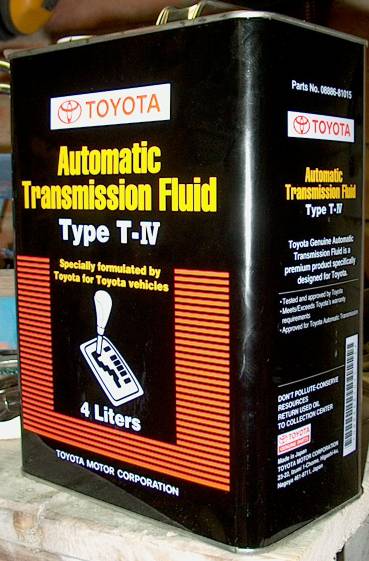 |
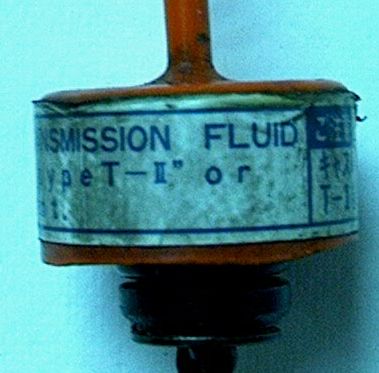 |
| Part number: 08886-81015 - $23 Aud - order from Toyota or Lexus | V8 dipstick clearly says T-II |
Browsing the Castrol, Penzoil and Valvoline catalogs today at Andrews work (MotorMate). None of them have a Toyota Soarer listing since it is not an official import. Next thing to look for is Lexus LS400 with the 1UZ-FE V8 motor (same engine/trans as our car). The Penzoil and Valvoline catalogs both had a "refer to delaer" entry - no recommendation given - and certainly no Dexron II equivalent listed for it. The Castrol catalog listed Castrol Transmax Z as being suitable. This stuff is real dear at $60 AUD for 4 litres (compared to $23 for Toyota Type IV). Here is the blurb for Transmax Z:
CASTROL TRANSMAX Z: A full synthetic DEXRO III type automatic
transmission fluid that has demonstrated outstanding performance in high temperature and
sever duty applicatoins. Particularly recommended for retarder adn automatic transmissions
with integral retarders, competition applications and "one armed bandits".
Approved against Mercedes-Benz 2363.8, Voith G607 (DIWZ Transmissions) and ZF TE-ML 14 for
extended drain service. Approved by JATCO against MATIC D requirements.
Maybe used wherever DEXRON, DEXRON II or DEXRON III; Ford Mercon, M2C-138CJ, M2C-166H type
fluids are recommended. Particularly f#suitable for drag racing, towing or arduous high
temperature service in cars, 4WD's or commercial vehicles. Recommended for all Allison
"WT" model transmissions. Dyed green for identification. NOT recommended where
Ford M2C-33F or G fluids are specified.
Castrol don't recommend the cheaper TQ DEXRON III, only the fancy synthetic TRANSMAX Z. So you would think that the T-II and T-IV Toyota fluids are very similar to the DEXRON II and III family, but perhaps a higher spec. Since the genuine T-IV is so much cheaper then the choice is easy.
On the Internet there is no company that has a T-II or T-IV or recommended Toyota transmission fluid - no company will recommend DEXRON II as a suitable substitute for T-II or T-IV. The Toyota ATF range is always listed as a separate item - never lumped in with the DEXRON crowd. Some mechanics and technicians will recommend DEXRON II, "we never had any problems - we have always used it" - is commonly heard amongst these people.
I have read several Lexus and Soarer owners reporting the same sort of symptons about their trans over and over again. It usually goes something like the following:
So a common problem is the trans not being smooth unless Type T-IV is used. This is interesting as this was backed up by some internet references talking about common symptons when the wrong fluid is used for a transmission - Torque Convertor shudder is a common sympton for a fluid that isn't quite right for the transmission.
The following site is an absolute gem - read the whole thing for sure. Site: http://www.babcox.com/editorial/bf/bf119930.htm
Here are some extracts:
As for import applications, many vehicle manufacturers require ATFs that meet Dexron II or III specifications or their own unique specifications. The reason for this is because the design of the torque converter, clutches and friction materials vary from manufacturer to manufacturer. Lexus, for example, requires a special Toyota T II type fluid. For this reason, always refer to the vehicle owners manual or an ATF application guide for the type of fluid required.
most transmission problems and failures are the direct result of neglected fluid. The question is, are you still changing fluid the "old fashioned" way?
For years, many shops simply dropped the pan and refilled the transmission with ATF. This type of service is better than no service at all, but it’s not really a complete job because the pan only holds about 25 to 30 percent of the transmission’s total fluid capacity. The rest is mostly in the torque converter. A simple drain and fill replenishes only one-fourth to one-third of the fluid that’s in the transmission
Oxidation, viscosity breakdown and degradation of the friction-modifying additives reduce the fluid’s ability to perform properly. Consequently, the hotter the fluid runs, the faster it breaks down and the sooner it needs replaced.
Fluid in good condition should be red like new fluid. Some discoloration with use is normal, but if the fluid is brown or smells like burnt toast, it is badly oxidized and is overdue for a change. Varnish on the dipstick would be another indication of fluid neglect and the need for a change.
A quick way to test for worn transmission fluid is to do a "blotter" test. Place one or two drops of ATF from the transmission on a paper towel and wait 30 seconds. If the spot is widely dispersed and red or light brown in color, the fluid is in satisfactory condition. But if the spot does not spread out and is dark in color, the ATF is oxidized and should be changed.
FLUSHING THE OLD FLUID
Regardless of the type of ATF a transmission requires, it’s important to replace as
much of the old fluid as possible when servicing the fluid and filter. Some flushing
machines connect to the ATF cooler lines to simultaneously drain the old fluid while
adding fresh fluid. This is done while the engine is idling and fluid is circulating
through the cooler lines. With this type of equipment, various adapters are required to
make the connections. Some units have a booster pump to speed up the process on vehicles
where ATF flow is slow (some Asian transmissions). This type of flushing procedure does
not require dropping the pan or replacing the filter, but a filter replacement is
recommended and should be done after flushing (fresh fluid from the pan can be recovered
and put back into the transmission after the filter has been replaced to eliminate waste.)
You can flush the fluid yourself at home without any fancy equipment. I just flushed a ZF 4 speed trans - same principles apply. Undo the top oil cooler line going into the radiator. Put a large diameter clear plastic hose over the brass thread on the radiator. Place the end of the hose into a container. Start the car for 2-4 secs and observe the oil going through the hose. Mine started out looking like mud. Turn car off. Place funnel in dipstick and refill trans with fresh oil. Start car again for 2-4 secs and watch the fluid again. I used a graduated clear plastic bottle - I knew how much oil was coming out - so I knew how much oil to put back in. When the oil started to look clear and red then I was done - took 12 litres of fluid to get it to this stage. Reassemble the oil cooler line, check level - go for a drive - check level again. Capacity is about 8 litres. Draining the pan or sucking it out the dipstick I could only get 2 litres out at a time no matter what I did.
Don't just assume your mechanic or dealer knows what fluid to use. Ask them what they will use and make sure it's the right one. (Some people recommend watching the mechanic pour it in, and for good reason! We have been told about mechanics who said they were using ATF+3 when they were not. Is a customer's transmission worth the $10 for better fluid?)
All Chrysler four-speed automatic transmissions* are very sensitive to the quality of the transmission fluid.
If a mechanic says he can substitute a little DEXRON and it won't do any harm, LEAVE!
If someone says he can use DEXRON plus an "anti-friction additive" in your Chrysler transmission, LEAVE!
WHY? The friction characteristics of DEXRON are different from 7176. It is a "grabbier" fluid. The Chrysler transmission has an electronic system which continuously senses the behavior of the transmission and regulates shifts accordingly. If DEXRON is used, the clutches inside the transmission will "grab", and the electronic controls, which sample the operation of the transmission about 140-180 times a second, will let up on the clutches. The clutches will then slip excessively, the transmission will try to tighten up on them, and due to the characteristics of DEXRON, they will again grab. This will occur at the 140-180 times per second rate, and the transmission will have a shuddering feel to the shifting. This is also very hard on the clutches, and they will have a short life.
There is NO UNIVERSAL TRANSMISSION FLUID. DO NOT USE DEXRON!
This is from a Chrysler site - there are some good lessons here for us. Don't bother with Dexron II when you can get the good stuff T-IV for just about the same price. Site: http://www.allpar.com/fix/trans.html
General Motors has two new rigorous tests that evaluate an ATF’s anti-shudder capabilities and sprag clutch wear. The key issue here is torque converter shudder protection. Shudder is merely what happens when two pieces side-by-side inside the transmission rub together but rotate at slightly different speeds. Without protection from the ATF, the two pieces may “stick-slip” causing a shudder or vibration. Not all ATF’s provide that protection successfully. Pennzoil® DEXRON®-III MERCON® ATF however, was used as a passing (non-shuddering) reference fluid in developing the new anti-shudder test procedure. It can correct fluid-related shudder problems while other brands of ATF may actually cause fluid-related shudder. However, shudder can also be the result of numerous mechanical problems, which can’t be fixed with shudder-resistant ATF.
A lot of talk about "shudder" isn't there? This site talks about the new Penzoil ATF and how great it is - but Toyota isn't mentioned anywhere - so Penzoil don't recommend their DEXRON family for the Toyota either. Site : http://oil-store.com/OilStore/ATF%20Nutshell.htm
Dexron III Supreme is not recommend for use in those automatic transmission that specify the use of Chrysler ATF+@ Type 7176, ATF+3, ATF+4, Ford Mercon V, Honda Genuine MT Fluid, Honda Genuine MTX Fluid, Honda Genuine CVT Fluid, Hyundai SP-II Automatic Transmission Fluid, or Toyota ATF Type T or T-IV fluids.
No doubt about this statement is there? - DEXRON III is NOT suitable for Toyota Type T or T-IV (is that different to T-II though? - I couldn't find one recommendation for T-II). A whole list of specs for this DEXRON III is also listed. Site : http://www.schaefferoil.com/data/204S.html
TYPICAL APPLICATIONS All automatic transmissions (pre-1992) where DEXRON ® , DEXRON ® -II, or MERCON ® fluids are specified. Automatic transmissions in many import cars such as Acura, Honda, Mazda, Nissan, and Toyota (refer to owner's manual).
Here Toyota is mentioned - but the key word is "many" - not "all". Front wheel drive Toyotas have different specs for the trans than the rear wheel drive models. In the Castol catalog there is a listing for the other Toyotas - only the rear wheel drive model has the expensive TRANSMAX Z specified. So no all Toyota transmissions are the same. Site : http://www.tosco.com/internet_pub/repository/lubes/6675_mp_atf7.pdf
PENNZOIL ® ATF provides superior wear protection for all passenger cars and light trucks requiring the use of a Type A or Type A Suffix A, DEXRON ® , DEXRON ® -II, DEXRON ® -IIE, DEXRON ® -III or MERCON ® Automatic Transmission Fluid -- General Motors, Ford (other than M2C33F or Type F fluids), Chrysler, American Motors, Nissan, Honda, VW, Subaru, Mitsubishi, Isuzu, Toyota, Fiat, Audi, Alfa Romeo, Renault, Porsche and Mercedes Benz.
Again Toyota is used - but which one? site: http://www.pennzoil.com/TechData/Pdsheet/Commercial_Industrial/Gear&Transmission/pdf/ATF.pdf
Upgrading your Automatic Transmission for faster acceleration
Many of us feel the need for speed - not only speed but that satisfying push in the back when we floor it. The standard Soarer transmission is wonderfully smooth and lives a long healthy life. But if you want a quicker tyre squealing take off and chirping tyres on the upshift you will need to upgrade your transmission. I have been talking to Michael from MV Automatics in Blackwood SA - a Soarer specialist - when I rang this morning a TT owner with a grin from ear to ear was there talked to me about his hot, custom cream leather TT. As per usual this particular TT owner never wastes time on the net - I have his phone number now and will do a visit, trans review and photo shoot on the weekend. He had a shift kit fitted - changes are now 3-4 times quicker with the trans chirping the wheels on the upchange and all mid gear popping gone.
Anyway it was a pleasure to talk to someone who is an expert and up to his elbows in Soarer transmissions - he speaks well and knows his stuff - a logical, balanced, intelligent sort of bloke who had a refreshing scientific approach - I was impressed.
The upgrade path goes something like this: The standard Soarer Trans (both cars) is an A340. The standard torque converter can have the stall speed lifted by 550 rpm - taking it from around 2200 to 2750 rpm. This lets the engines get further into their torque curve before engaging - it's like revving the motor on a manual and then letting out the clutch - a faster more aggressive take off. Any change to the stall speed must be accompanied by an oil cooler. MV fit Soarer transmission oil coolers regularly. While the trans is out it's time for the front and real seal replacement. Servicing is a good idea and an optional shift kit can be fitted - you can ask for different shift speeds - from standard all the way to dash cracker (dash cracker - ain't that a wonderful expression!). So if you want the max then he can fit a 4000 rpm stall, give you full manual control and lightning tyre chirping dash cracking changes. For all those who fit a engine trans combo to a kit car and find the trans no longer works he also has a computer shift adaptation (based on a Gameboy of all things!) that is fully programmable and will shift the trans for you.
Here is the price breakdown:
So I am going for the 2750 rpm stall converter and while its our I will negotiate getting the changes a bit quicker - I don't want dash crackers - just want to get rid of the flare and speed up the changes.
The dipstick on my 1991 Soarer clearly says T-II. I have been a fan of Toyota Type IV because the price is competitive and it comes in that natty 4 litre can. And there are anecdotal stories of "my car went better when I changed to Toyota Type IV" that sound real attractive.
Michael (like CMI Toyota and Adelaide Lexus garage) use nothing but Dexron II (I disagree with this). Also called Dex II and D2 due to the copyright by GM. Dexron III was brought out with more zinc in it to cope with clutch pack problems on VR commodores onwards. He believes that full syn doesn't do much either - the silicon seals in our trans will fail before taking advantage of the full syn higher boiling point anyway. So Dex II won't instantly blow up your trans instead of Toyota Type IV.
Contact Michael from MV Automatics 1 Stirling Rd Blackwood 5051 (08) 8370-0430
Never let anyone tell you that Dexron automatic transmission fluid (ATF) is ok for your SOARER. The shift quality is not as good. Lexus Adelaide and Toyota Adelaide both told me that they would use Dexron type ATF !!! Lexus Melbourne (Brighton) said Type IV. I have seen numerous Internet references describing Dexron ATF woes and Type IV being the only correct ATF. Toyota CMI parts guy was happy to order in the Type IV no problems at all. The parts guy is totally separate to the service guy, he will get you the correct part no worries but leaves fluid recommendations to the service people.
"Genuine TOYOTA Automatic Transmission Fluid Type T-IV is a premium quality ATF specifically formulated for Lexus and TOYOTA automatic transmissions, and is recommended for transmissions where Toyota Automatic Transmission Fluid Type T-II, Type T-III and Type T-IV fluid is required.
It is not recommended for automatic transmissions where DEXRON II or III fluids and TOYOTA Automatic Transmission Fluid Type T are required. See repair manual or owner’s manual before use. Regarding any further questions, please contact the place of purchase."
This was purchased from CMI TOYOTA, Adelaide (08) 8238 5544
New can is black with a splash of red and yellow - Part number for new Type IV is 08886-81015
photo to follow.
Old Part number 08886-01705 $23 – cheap!
